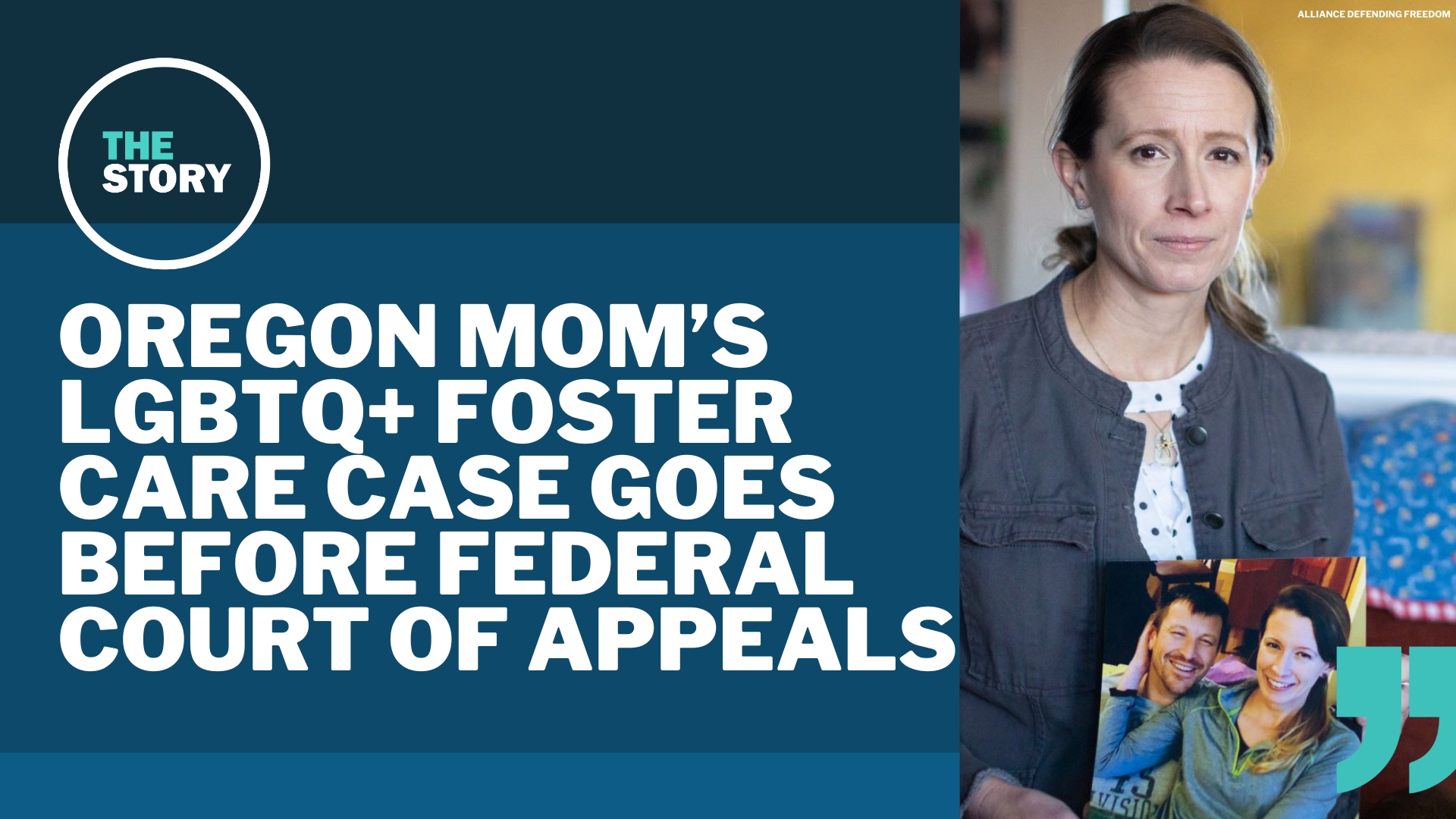MALHEUR COUNTY, Ore. — A trio of judges in Seattle heard arguments Tuesday in the case of an eastern Oregon woman, Jessica Bates, who was denied the ability to become a foster parent over her anti-LGBTQ views.
Her attorneys are appealing to the Ninth Circuit Court of Appeals, claiming the state is curbing her freedom of speech and religion.
Meanwhile, the state has argued that Bates is allowed to hold whatever religious beliefs she wants on her own and with her biological kids, but with foster kids in her home, the state acknowledged that there would be some restrictions on her speech.
'I cannot support this behavior'
Bates, a single mother with five biological children in Malheur County, claimed God told her to adopt two more kids after her husband died in a car crash in 2017. That revelation led Bates to Oregon's foster care system, where she applied to adopt two kids — but a particular section in the application stopped her cold.
Oregon's Department of Human Services requires that certified foster homes "respect, accept and support the race, ethnicity, cultural identities, national origin, immigration status, sexual orientation, gender identity, gender expression, disabilities, spiritual beliefs and socioeconomic status of a child."
DHS requires that adoptive parents meet the current and lifelong needs of a child's physical and emotional safety and well-being. The Oregon Foster Children's Bill of Rights states that children in foster care have the right to determine and express their gender identity, dress themselves accordingly, and have a say over decisions about their body when it comes to medical care.
In short: foster parents must support LGBTQ kids in their care, including using their correct pronouns and providing medical care, including gender-affirming care.
But Bates replied that she won't do that because of her Christian beliefs, calling providing gender-affirming medical care, such as hormone injections, "child abuse."
"I need to let you know I cannot support this behavior in a child. I have no problem loving them and accepting them as they are, but I would not encourage them in this behavior. I believe God gives us our gender/sex and it's not something we get to choose," she said in a note to DHS and the person handling her application.
Currently, Bates is suing the state, trying to get the rule suspended, represented by the Alliance Defending Freedom — a right-wing law firm that works on Christian religious freedom cases, often in opposition to LGBTQ+ rights.
Late last November, a judge denied her request, saying she had no right to force foster kids to align with her religion and beliefs.
U.S. District Judge Adrienne Nelson wrote in her judgment, "This Court questions whether plaintiff's willingness to 'love and support' a child is sufficient to ensure that the child will feel loved and supported."
She added that the argument of the state rejecting her solely due to her religion doesn't hold up, writing, "Religious applicants may also have neutral or pro-LGBTQ+ views" and that "religious beliefs are not the only basis for anti-LGBTQ+ views."
Oral arguments
The trio of federal judges heard oral arguments Tuesday from both sides, but expressed to Bates's attorney — Jonathan Scruggs, senior counsel with Alliance Defending Freedom — that they "really have trouble understanding how this is inhibiting your client's ability to express her views or practice her religion as she wants."
The judges also questioned how the state's decision exactly constituted discrimination, as Bates generally "can say whatever she wants to anybody else." The state's focus, they said, is on the child and how they can be affected by "what she says and how she treats the child," not solely based on aligning beliefs.
Scruggs argued, "The government is essentially conditioning a benefit or a license on my client not expressing her particular views, as the district court said inherent in the rule is that my client cannot espouse certain views on LGBTQ status and the way the rule operates."
"She can espouse all she wants to other people," the judges repeated.
"I don't think we should force the Muslim family to say you can't explain your religious beliefs in your own house, that you can hold these beliefs, but you can't espouse them," Scruggs replied.
Attorney Philip Thoennes, who represents the state, pointed out, "I don't think it's quite as restrictive as (the) plaintiff would have it ... the state is not trying to extinguish the plaintiff's viewpoints about human sexuality or gender identity. Of course, that would make constitutional problems.
"What the state asks (the) plaintiff to be able to do is in recognizing that she does hold those beliefs (but) be able to parent or provide childcare to a child that recognizes that a child might be different. It might not conform with those beliefs that (the) plaintiff holds and to provide child care in a way that respects the child."
For instance, Thoennes continued, Bates could not tell the child if they were LGBTQ "that homosexuality is a sin, and the child would go to hell."
There was also a question of how selective foster parents are allowed to be after they are certified, such as if a Christian family, for instance, were to be paired with a Jewish child.
The judges replied that there is some selectivity allowed in matching and that "the system allows opt-out, if you will, in race, gender and religion," but that is something that happens after the certification process, not in the particular stage of Bates' application.
The appeals court could either side with last year's district court or overrule that decision. If overruled, Bates can continue the foster care certification process.

